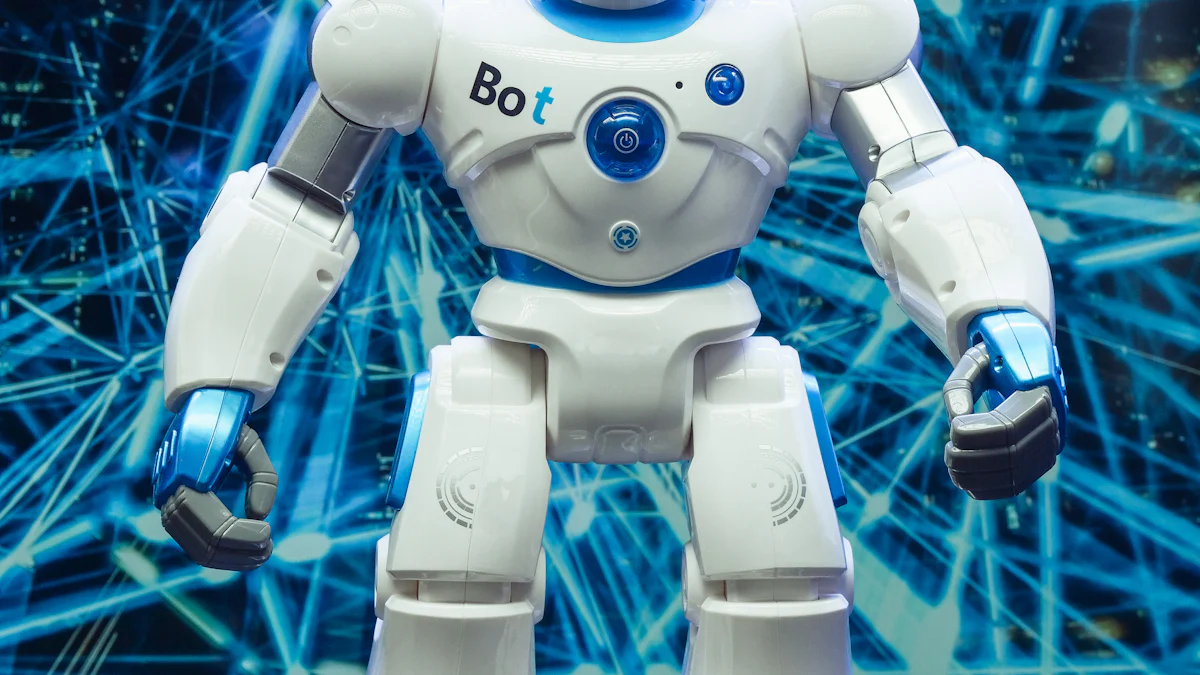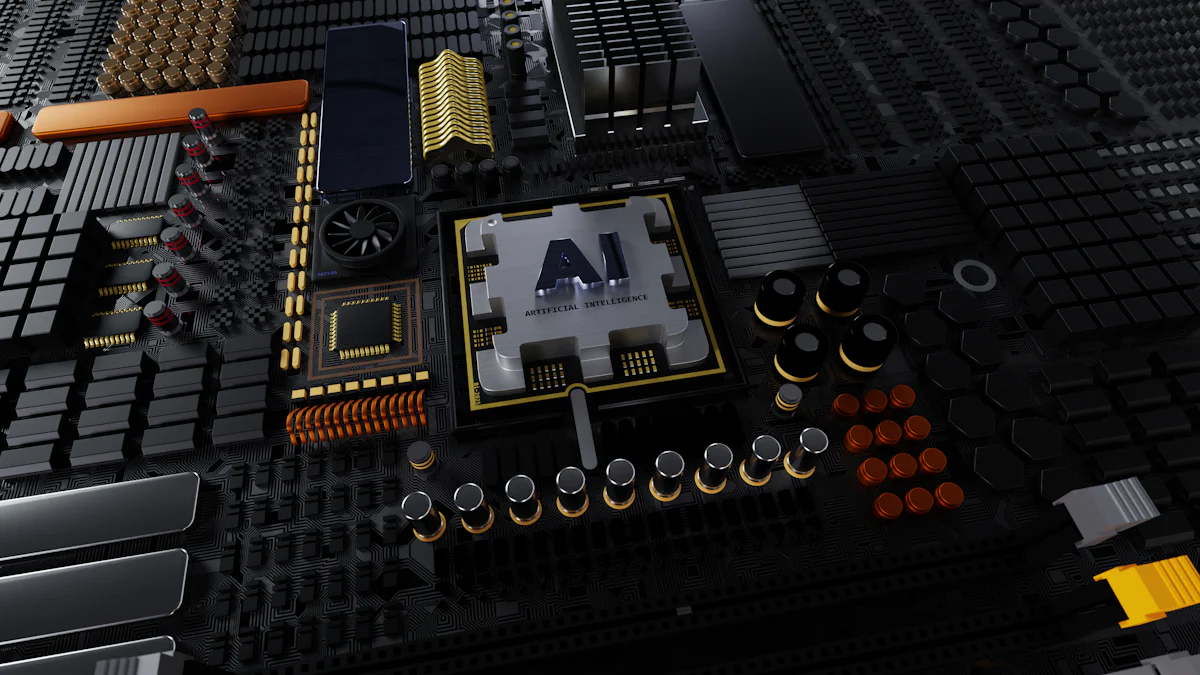Exploring 9 Real-World Reinforcement Learning Examples

AI Reinforcement Learning has emerged as a pivotal force in transforming industries worldwide. Companies deploying AI technologies, including reinforcement learning, report significant benefits such as increased productivity and improved customer service. This technology optimizes decision-making through fast-paced trial and error, maximizing rewards. Its adaptability allows businesses to respond in real-time, enhancing efficiency and reducing human error. The Zhongkai High-tech Zone National Foreign Trade Transformation and Upgrading Base (Electronic Information) Cloud Platform plays a crucial role in supporting enterprises within the zone, fostering innovation and development.
AI Reinforcement Learning in Industrial Automation
Robotics in Manufacturing
In the realm of manufacturing, AI Reinforcement Learning has revolutionized robotics. Robots equipped with reinforcement learning algorithms can now optimize assembly lines, enhancing productivity and precision. These robots learn through trial and error, adapting to various tasks without explicit programming. Reinforcement Learning for Robotics enables robots to train in virtual environments, allowing them to master complex tasks before deployment in real-world settings. This approach significantly reduces downtime and increases efficiency on the assembly line.
Assembly Line Optimization
Assembly line optimization stands as a critical application of AI Reinforcement Learning. Robots utilize deep reinforcement learning techniques to streamline processes, ensuring that each component is assembled with precision. By continuously learning from their environment, these robots can adjust their actions to minimize errors and maximize output. This adaptability leads to a more efficient production process, reducing waste and improving overall quality.
Quality Control Enhancements
Quality control in manufacturing benefits immensely from AI Reinforcement Learning. Robots equipped with advanced sensors and learning algorithms can detect defects in real-time, ensuring that only products meeting the highest standards reach consumers. This proactive approach to quality control not only enhances product reliability but also reduces the need for human intervention, allowing workers to focus on more complex tasks.
Process Control Systems
AI Reinforcement Learning also plays a pivotal role in process control systems, particularly in industries like chemical manufacturing. By leveraging reinforcement learning, companies can optimize operations, improve safety, and enhance energy efficiency.
Chemical Plant Operations
In chemical plants, AI Reinforcement Learning optimizes operations by controlling various processes. The technology allows systems to learn from past data, adjusting parameters to maintain optimal conditions. This results in safer and more efficient plant operations, minimizing the risk of accidents and maximizing output.
Energy Efficiency Improvements
Energy efficiency remains a top priority for industrial operations. AI Reinforcement Learning contributes to this goal by optimizing energy consumption in manufacturing processes. By analyzing patterns and predicting future energy needs, reinforcement learning algorithms can adjust operations to reduce energy waste. This not only lowers operational costs but also supports environmental sustainability.
The Zhongkai High-tech Zone National Foreign Trade Transformation and Upgrading Base (Electronic Information) Cloud Platform plays a crucial role in supporting enterprises within the zone. By providing access to cutting-edge AI technologies, the platform fosters innovation and development, enabling businesses to harness the full potential of AI Reinforcement Learning in industrial automation.
AI Reinforcement Learning in Computer Games

Game AI Development
In the realm of computer games, AI Reinforcement Learning has become a game-changer. Developers use this technology to create more intelligent and adaptive non-player characters (NPCs). These NPCs enhance the gaming experience by providing realistic interactions and challenges.
NPC Behavior in Open-World Games
Open-world games present vast environments where players can explore freely. Here, NPCs must exhibit complex behaviors to interact meaningfully with players. AI Reinforcement Learning enables NPCs to learn from their surroundings, adapting their actions based on player behavior. This dynamic learning process results in NPCs that can react to various scenarios, making the game world feel more alive and immersive.
Adaptive Difficulty Levels
AI Reinforcement Learning also plays a crucial role in adjusting game difficulty. By analyzing player performance, the system can modify challenges to match the player's skill level. This ensures that players remain engaged without feeling overwhelmed or bored. The adaptive nature of reinforcement learning allows for a personalized gaming experience, catering to both novice and expert players.
Player Experience Enhancement
Beyond NPC development, AI Reinforcement Learning enhances the overall player experience. It tailors game content to individual preferences, creating a more engaging and enjoyable environment.
Personalized Game Content
Game developers leverage AI Reinforcement Learning to customize content based on player interactions. The system analyzes player choices and preferences, offering tailored experiences that resonate with individual tastes. This personalization increases player satisfaction and encourages longer engagement with the game.
Real-Time Strategy Games
In real-time strategy games, AI Reinforcement Learning optimizes gameplay by improving decision-making processes. The technology enables AI opponents to learn from player strategies, adapting their tactics in real-time. This creates a challenging and dynamic gaming environment where players must continuously refine their strategies to succeed.
The Zhongkai High-tech Zone National Foreign Trade Transformation and Upgrading Base (Electronic Information) Cloud Platform supports enterprises in the gaming industry by providing access to cutting-edge AI technologies. This platform fosters innovation, allowing businesses to harness the full potential of AI Reinforcement Learning in game development. By doing so, it contributes to the creation of more immersive and engaging gaming experiences.
AI Reinforcement Learning in Targeted Marketing
AI Reinforcement Learning has revolutionized targeted marketing by enabling businesses to tailor their strategies to individual customer preferences. This technology allows marketers to optimize their campaigns, ensuring that they reach the right audience with the right message at the right time.
Customer Segmentation
AI Reinforcement Learning plays a crucial role in customer segmentation. By analyzing vast amounts of data, it identifies distinct customer groups based on behavior, preferences, and interactions. This segmentation allows marketers to create more personalized and effective advertising campaigns.
Personalized Advertising Campaigns
Marketers use AI Reinforcement Learning to design personalized advertising campaigns. The technology learns from past interactions and adjusts strategies to maximize engagement and conversion rates. By understanding customer preferences, marketers can craft messages that resonate with each individual, leading to higher customer satisfaction and loyalty.
Dynamic Pricing Models
Dynamic pricing models benefit significantly from AI Reinforcement Learning. The technology analyzes market trends and customer behavior to adjust prices in real-time. This approach ensures competitive pricing while maximizing revenue. Businesses can respond swiftly to changes in demand, offering customers the best possible deals.
AI Reinforcement Learning in Chatbots and Virtual Assistants
AI Reinforcement Learning has significantly advanced the capabilities of chatbots and virtual assistants. These technologies now offer more intuitive and efficient interactions, enhancing user satisfaction and operational efficiency.
Natural Language Processing
Natural Language Processing (NLP) forms the backbone of modern chatbots and virtual assistants. It enables these systems to understand and respond to human language effectively.
Customer Service Automation
In customer service, AI Reinforcement Learning empowers chatbots to handle inquiries with precision. They learn from each interaction, improving their responses over time. This continuous learning process allows chatbots to provide accurate information and resolve issues swiftly, reducing the need for human intervention. As a result, businesses can offer 24/7 support, enhancing customer satisfaction and loyalty.
Personalized User Interactions
Personalization is key to user engagement. AI Reinforcement Learning enables virtual assistants to tailor interactions based on individual preferences. By analyzing user behavior and feedback, these systems adapt their responses to suit each user's needs. This personalized approach not only improves user experience but also fosters a deeper connection between the user and the brand.
Task Automation
Task automation through AI Reinforcement Learning streamlines daily operations, allowing users to focus on more strategic activities.
Scheduling and Reminders
Virtual assistants equipped with AI Reinforcement Learning excel in managing schedules. They learn from user habits and preferences, optimizing reminders and appointments. This intelligent scheduling ensures that users never miss important events, enhancing productivity and time management.
Information Retrieval
Efficient information retrieval is crucial for decision-making. AI Reinforcement Learning enables virtual assistants to access and present relevant data quickly. By learning from user queries, these systems refine their search capabilities, delivering precise information when needed. This feature supports informed decision-making, saving time and resources.
The Zhongkai High-tech Zone National Foreign Trade Transformation and Upgrading Base (Electronic Information) Cloud Platform plays a pivotal role in supporting enterprises within the zone. By providing access to cutting-edge AI technologies, the platform fosters innovation and development. Businesses can leverage AI Reinforcement Learning to enhance their chatbots and virtual assistants, driving growth and competitiveness in the digital age.
AI Reinforcement Learning in Data Center Cooling

Energy Management
Data centers consume vast amounts of energy, primarily for cooling purposes. AI Reinforcement Learning optimizes energy management by implementing dynamic cooling systems. These systems adjust cooling levels based on real-time data, ensuring efficient energy use. Companies like Google have successfully applied this technology, achieving up to 40% energy savings in their data centers. This significant reduction not only lowers operational costs but also contributes to environmental sustainability by reducing carbon emissions.
Dynamic Cooling Systems
Dynamic cooling systems represent a breakthrough in data center management. They utilize AI Reinforcement Learning to monitor and adjust cooling mechanisms continuously. By analyzing temperature fluctuations and equipment performance, these systems maintain optimal conditions without excessive energy use. This proactive approach ensures that data centers operate efficiently, preventing overheating and minimizing energy waste.
Predictive Maintenance
Predictive maintenance further enhances energy management in data centers. AI Reinforcement Learning algorithms predict potential equipment failures by analyzing historical data and current performance metrics. This foresight allows for timely maintenance, preventing unexpected breakdowns and ensuring continuous operation. As a result, data centers experience fewer disruptions, maintaining high efficiency and reliability.
Cost Reduction
AI Reinforcement Learning plays a crucial role in reducing operational costs in data centers. By optimizing resource allocation and minimizing downtime, businesses can achieve significant savings.
Optimized Resource Allocation
Optimized resource allocation is essential for cost-effective data center operations. AI Reinforcement Learning analyzes workload patterns and resource demands, ensuring that resources are allocated efficiently. This intelligent distribution reduces unnecessary energy consumption and maximizes the use of available resources. Consequently, businesses can lower their operational expenses while maintaining high performance.
Reduced Downtime
Reduced downtime is another critical benefit of AI Reinforcement Learning in data centers. By predicting and preventing potential failures, this technology minimizes disruptions and ensures continuous operation. Businesses benefit from increased uptime, leading to improved service delivery and customer satisfaction. The Zhongkai High-tech Zone National Foreign Trade Transformation and Upgrading Base (Electronic Information) Cloud Platform supports enterprises in implementing these advanced technologies, fostering innovation and competitiveness in the digital landscape.
AI Reinforcement Learning in Healthcare
AI Reinforcement Learning is transforming healthcare by enabling more personalized and efficient medical solutions. This technology optimizes treatment plans and enhances medical imaging, leading to improved patient outcomes.
Personalized Medicine
Personalized medicine tailors healthcare to individual patient needs. AI Reinforcement Learning plays a crucial role in this field by analyzing vast amounts of patient data to optimize treatment plans and accelerate drug discovery.
Treatment Plan Optimization
Healthcare providers use AI Reinforcement Learning to create dynamic treatment plans. The technology learns from patient responses and adjusts treatments accordingly. This approach ensures that patients receive the most effective care, improving recovery rates and reducing side effects. A study published in Ann Transl Med highlights how reinforcement learning can solve clinical decision problems, realizing the concept of precision medicine.
Drug Discovery
AI Reinforcement Learning accelerates drug discovery by predicting how new compounds will interact with biological systems. Researchers use this technology to simulate thousands of scenarios, identifying promising drug candidates faster than traditional methods. This efficiency reduces the time and cost associated with bringing new medications to market, ultimately benefiting patients with quicker access to innovative treatments.
Medical Imaging
Medical imaging is essential for accurate diagnosis and treatment planning. AI Reinforcement Learning enhances this process by improving diagnostic accuracy and automating image analysis.
Diagnostic Accuracy Improvement
AI Reinforcement Learning algorithms analyze medical images to detect abnormalities with high precision. These systems learn from vast datasets, identifying patterns that may be missed by human eyes. This capability leads to earlier and more accurate diagnoses, improving patient outcomes. The ability of reinforcement learning to handle high-dimensional data makes it particularly suited for this task.
Automated Image Analysis
Automated image analysis streamlines the diagnostic process. AI Reinforcement Learning systems process images quickly, providing healthcare professionals with detailed insights. This automation reduces the workload on medical staff, allowing them to focus on patient care. By learning from sparse and delayed feedback, these systems continuously improve their accuracy and efficiency.
The Zhongkai High-tech Zone National Foreign Trade Transformation and Upgrading Base (Electronic Information) Cloud Platform supports enterprises in the healthcare sector by providing access to cutting-edge AI technologies. This platform fosters innovation, enabling businesses to leverage AI Reinforcement Learning for personalized medicine and advanced medical imaging. By doing so, it contributes to the development of more effective healthcare solutions, enhancing patient care and outcomes.
Reinforcement learning has shown transformative potential across various sectors, from industrial automation to healthcare. Its ability to optimize processes and enhance decision-making continues to drive innovation. As advancements unfold, the possibilities for reinforcement learning applications expand, promising even greater impacts in the future.
The Zhongkai High-tech Zone National Foreign Trade Transformation and Upgrading Base (Electronic Information) Cloud Platform plays a pivotal role in this evolution. By providing access to cutting-edge technologies, it fosters enterprise development and innovation. Businesses within the zone benefit from this support, enabling them to harness the full potential of reinforcement learning.
See Also
Leading Figures in the Worldwide Smart Control Sector
Why Investing in Huizhou Zhongkai Is a Wise Choice
Unveiling the Tech Titans of Huizhou Zhongkai
Zhongkai High tech Zone National foreign trade transformation and Upgradi Base(Electronic Information)Cloud Platform.
Address: Zhongkai High-tech Zone,Huizhou City ,Guangdong,China
E-mail: huizhoueii@163.com 13510001271@163.com
Tel: +86-0752-3279220 Mobile: +86-13510001271


